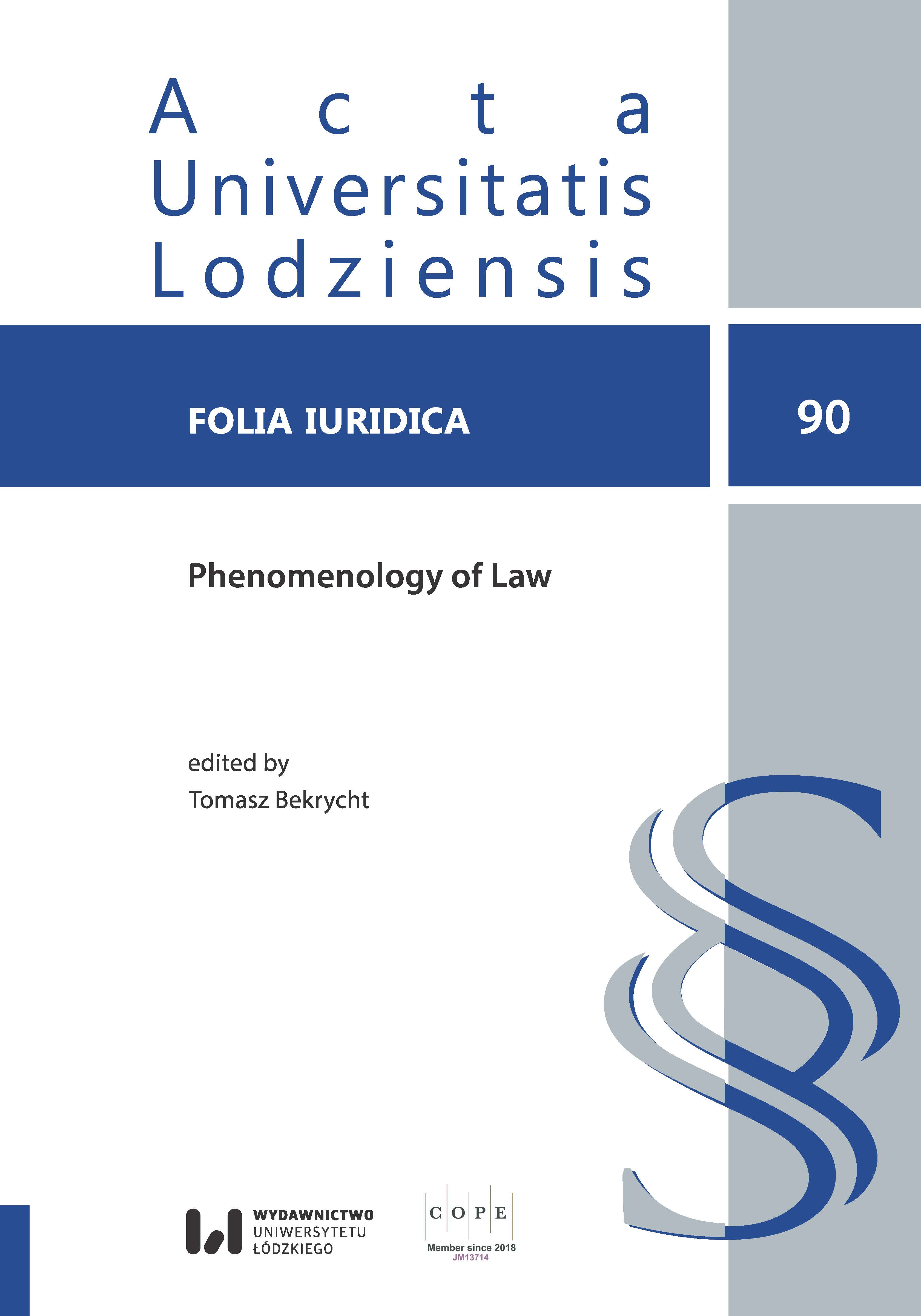Grasping an Ought. Adolf Reinach’s Ontology and Epistemology of Legal and Moral Oughts
DOI:
https://doi.org/10.18778/0208-6069.90.03Keywords:
Adolf Reinach, ontology of ought, epistemology of ought, social acts, feeling a normAbstract
We almost every day direct our actions with reference to social, moral or legal norms and oughts. However, oughts and norms cannot be perceived through the senses: how can we “grasp” them, then? Adolf Reinach distinguishes enacted norms and oughts created through a social act of enactment, from moral norms and oughts existing in themselves independently of any act, knowledge or experience. I argue that this distinction is not a distinction between two species of oughts within a common genus: it is rather a deeper ontological distinction between two modes of existence that are quite different, even though both are objective, according to Reinach. This ontological distinction is reflected in the way in which enacted oughts and moral oughts can be grasped, respectively: in the former case, the enacted ought is grasped by going back to the underlying social act from which it springs; in the latter, a “grasping through feeling” (fühlende Erfassen) of the moral values is implied.
Downloads
References
Conte, Amedeo Giovanni. 2000. “Nomotropismo: agire in funzione di regole”. Sociologia del diritto 27(1): 7–32. https://doi.org/10.1400/67523
Google Scholar
De Vecchi, Francesca. Lorenzo Passerini Glazel. 2012. “Gli atti sociali nella tipologia degli Erlebnisse e degli atti spontanei in Adolf Reinach (1913)”. In Eidetica del diritto e ontologia sociale. Il realismo di Adolf Reinach/Eidetics of Law and Social Ontology. Adolf Reinach, the Realist. 261–280. Edited by Francesca De Vecchi. Milano–Udine: Mimesis.
Google Scholar
Fittipaldi, Edoardo. 2012. Everyday Legal Ontology: A Psychological and Linguistic Investigation within the Framework of Leon Petrażycki’s Theory of Law. Milan: LED.
Google Scholar
Lorini, Giuseppe. 2018. “Animal Norms: An Investigation of Normativity in the Non-Human Social World”. Law, Culture and the Humanities: 1–22. https://doi.org/10.1177/1743872118800008
Google Scholar
DOI: https://doi.org/10.1177/1743872118800008
Passerini Glazel, Lorenzo. 2017. “Normative Experience: Deontic Noema and Deontic Noesis”. Phenomenology and Mind 13: 96–107. https://doi.org/10.13128/Phe_Mi-22432
Google Scholar
Passerini Glazel, Lorenzo. 2019. “Deontic Noema. A Contribution to a Theoretical Analysis of Normative Experience”. In The Experience of Law. Collection of Articles and Essays. 59–77. Compiled by Oleksiy Stovba, Natalia Satokhina, Ricardo Evandro Santos Martins. Kharkiv: Оleg Miroshnychenko.
Google Scholar
Passerini Glazel, Lorenzo. Forthcoming. “Leon Petrażycki’s Reconstruction of Normative Experiences”. In The Living Legacy of Leon Petrażycki: Contributions to the Social Sciences. Edited by Edoardo Fittipaldi, A. Javier Treviño. New York: Routledge.
Google Scholar
Petrażycki, Leon. 2011. Law and Morality. Translated by Hugh W. Babb. New Brunswick: Transaction Publishers.
Google Scholar
Reinach, Adolf. 1983. “The Apriori Foundations of the Civil Law”. Translated by John F. Crosby. Aletheia (3): 1–142.
Google Scholar
DOI: https://doi.org/10.1515/9783110329803.1
Reinach, Adolf. 1989a. “Die Überlegung: ihre ethische und rechtliche Bedeutung”. In Sämtliche Werke. 279–311. Edited by Karl Schuhmann, Barry Smith. Munich: Philosophia Verlag.
Google Scholar
Reinach, Adolf. 1989b. “Vortrag von Dr. Reinach über die Grundbegriffe der Ethik im Psychologischen Verein am 6. Juli 1906”. In Sämtliche Werke. 335–337. Edited by Karl Schuhmann, Barry Smith. Munich: Philosophia Verlag.
Google Scholar
Scheler, Max. 1973. Formalism in Ethics and Non-Formal Ethics of Values. Translated by Manfred S. Frings, Roger L. Funk. Evanston, IL: Northwestern University Press.
Google Scholar
Smith, James H. 2013. Wert, Rechtheit and Gut. Adolf Reinach’s Contribution to Early Phenomenological Ethics. Maynooth: National University of Ireland. [Dissertation]
Google Scholar
Wojtyła, Karol. 1994. Osoba i czyn oraz inne studia antropologiczne. Edited by Tadeusz Styczeń. Lublin: Towarzystwo Naukowe Katolickiego Uniwersytetu Lubelskiego.
Google Scholar
Downloads
Published
How to Cite
Issue
Section
License

This work is licensed under a Creative Commons Attribution-NonCommercial-NoDerivatives 4.0 International License.














